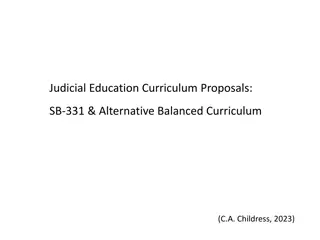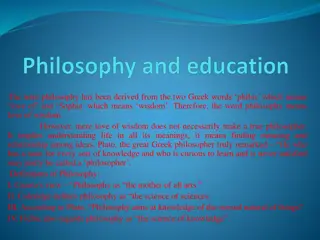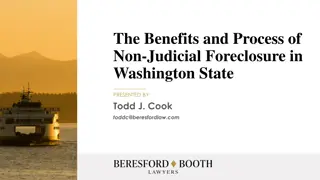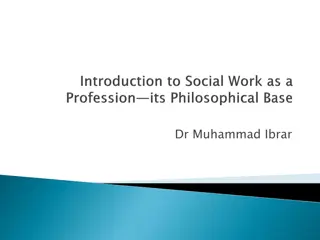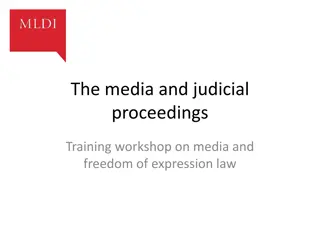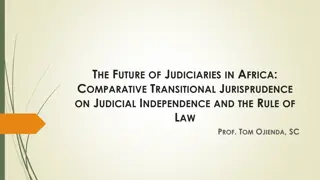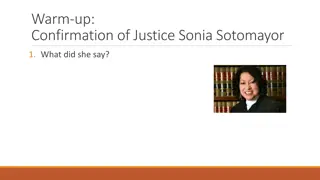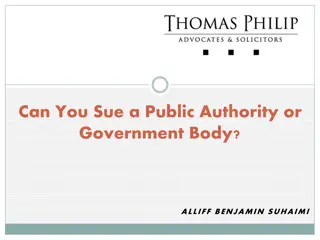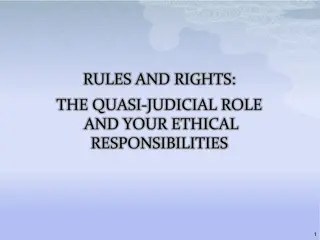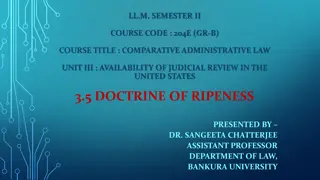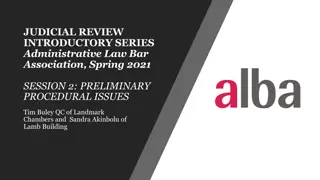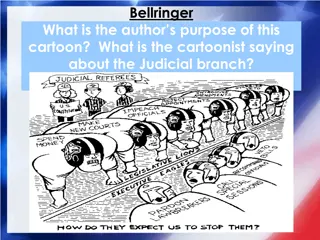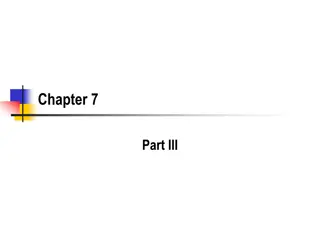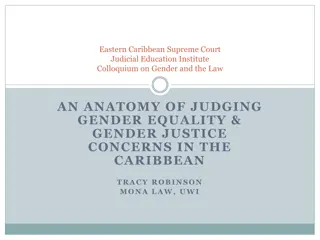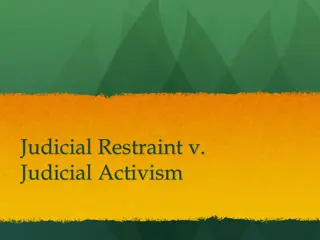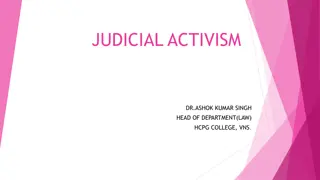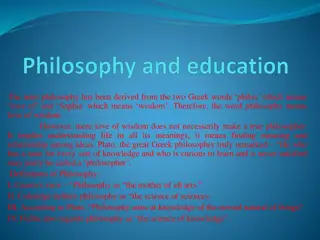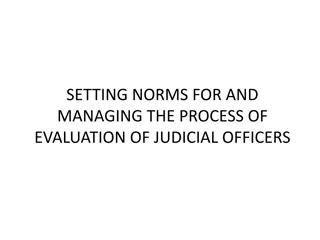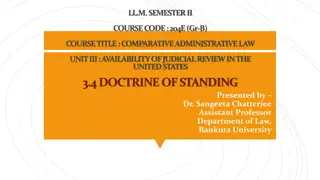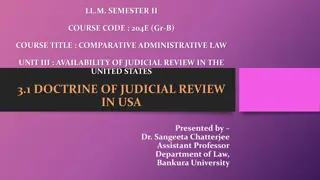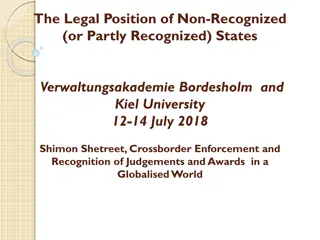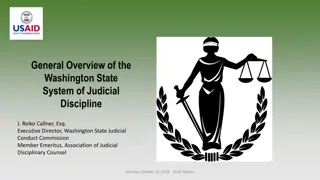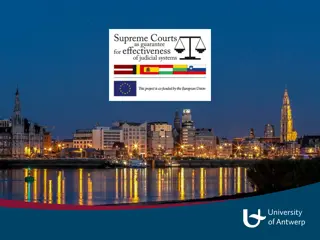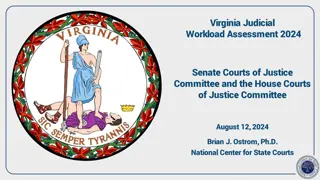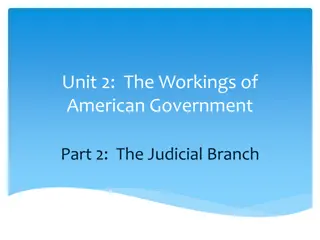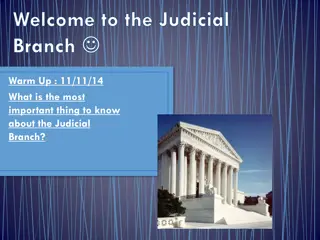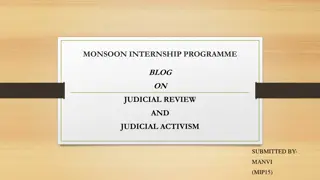Judicial Education Curriculum Proposals: SB-331 Overview
This content presents a series of proposals under SB-331 focusing on judicial education curriculum enhancements. It covers topics such as child abuse, psychological control, bias, trauma, intimate partner violence (IPV), and more. The proposals aim to equip judicial professionals with knowledge and
1 views • 15 slides
JUDICIAL REVIEW OF NATIONAL ACTION BY UNCLOS COURTS AND TRIBUNALS
International judicial review involves oversight by international courts and tribunals over the actions of States Parties in implementing their international commitments. UNCLOS courts exercise supervisory jurisdiction through grounds of review like due regard, reasonableness, necessity, and proport
1 views • 7 slides
Understanding the Essence of Philosophy: Love of Wisdom and Pursuit of Knowledge
Philosophy, derived from Greek words meaning "love of wisdom," encompasses a deep understanding of life's meanings and the interconnections among ideas. It is more than mere curiosity but a pursuit of knowledge encompassing all aspects of existence and truth. Indian philosophy views it as a vision o
0 views • 6 slides
Florida Judicial Ethics 2024: Learning Objectives and Resources
Explore common problems under the Code of Judicial Conduct, develop solutions and strategies, and utilize available resources to ensure ethical conduct in the judicial system. Judge Kroll and Mr. Teagle provide educational content but encourage individual analysis. Consult the Florida Judicial Code,
1 views • 81 slides
Overview of Non-Judicial Foreclosure Process in Washington State
Understanding the benefits and process of non-judicial foreclosure in Washington State, including the definition of foreclosure, two types of foreclosures, the reasons for choosing non-judicial foreclosure, who is eligible for this process, and the steps involved, such as the notice of default and t
0 views • 14 slides
Understanding the Philosophy of Social Work: A Deep Dive into Ethical Principles and Moral Philosophy
Exploring the complexity of the philosophy of social work, this text delves into ethical principles, moral philosophy, and the evolving perceptions of social workers in society, highlighting the crucial role of philosophy in shaping social work practices and principles.
0 views • 7 slides
Importance of Media in Judicial Proceedings: Safeguarding Fair Trials
Media plays a crucial role in ensuring the right to a fair trial by providing transparency, scrutiny, and accountability in judicial proceedings. Open justice, supported by media coverage, helps prevent miscarriages of justice and upholds fairness in legal processes. While media freedom is essential
3 views • 18 slides
Legal Education and Judicial Ethics Seminar - Transforming Legal Cultures
Enhance your understanding of the CPR overriding objective and its interpretative mandates in the legal context. Explore concepts of substantive and procedural justice, principles of proportionality, and the judicial oath of office. Delve into the Supreme Law of the Bahamas, right to protection of t
0 views • 54 slides
Essential Responsibilities and Management in Judicial Court System
Explore the vital aspects of maintaining judicial records, court management, judge responsibilities, and court work division in the judicial system. Learn about the skill sets required for effective court management, essential duties of a judge, and the administrative functions involved in the judic
0 views • 50 slides
The Future of Judiciaries in Africa: Comparative Transitional Jurisprudence
Judicial independence in Africa is crucial for upholding the rule of law and fostering economic growth. This article explores the key aspects of judicial independence, the challenges faced in implementing it, and the impact on governance and human rights. Countries in transition, such as Kenya, are
0 views • 25 slides
Enhancing Judicial Capacity for Environmental Law: Curriculum and Challenges
Environmental law curriculum for judicial education emphasizes the importance of knowledge and expertise in handling environmental justice issues. Prerequisites include competent rule of law, mature judicial system, independent bar, and well-equipped enforcement agencies. To address challenges faced
0 views • 18 slides
Understanding the Influences on Supreme Court Decision Making
Explore the essential aspects that influence how Supreme Court judges decide cases, including issues like judicial restraint vs. activism, influences on decision-making, precedent, and judicial philosophy such as originalism. Gain insights into the complexities surrounding constitutional interpretat
0 views • 9 slides
Understanding Judicial Review in Suing Public Authorities
Judicial review is the inherent right of courts to review decision-making processes of public bodies. It allows for challenging and analyzing decisions, granting public law remedies like declaration, certiorari, mandamus, prohibition, and quo warranto. Those adversely affected by public duty actions
0 views • 13 slides
Ensuring Judicial Independence and Accountability: Model Code of Judicial Conduct
An overview of the history and significance of the Model Code of Judicial Conduct, focusing on judicial independence, integrity, and accountability. The discussion highlights the crucial role of an impartial judiciary in upholding the rule of law and the efforts made to update and maintain ethical s
0 views • 16 slides
Quasi-Judicial Roles and Ethical Responsibilities in Decision-Making
Exploring the distinction between legislative and quasi-judicial roles in decision-making processes, this content delves into examples, principles, and ethical responsibilities. It emphasizes fairness, impartiality, and the importance of public trust in upholding ethical standards within quasi-judic
0 views • 34 slides
Understanding the Doctrine of Ripeness in Judicial Review
The doctrine of ripeness in judicial review focuses on the timing of court intervention, ensuring that cases are mature enough for adjudication. It aims to prevent premature decisions and conflicts with other branches of government, emphasizing the need for cases to be fit for judicial review before
0 views • 12 slides
Key Duties and Propositions in Judicial Review Proceedings
Key duties and propositions in judicial review proceedings emphasize the importance of cooperation, full disclosure of material facts, and the duty of candor to ensure fairness and uphold the rule of law. Judicial parties are expected to work collaboratively with the court and each other, providing
0 views • 13 slides
Analytic Versus Continental Philosophy in the 20th Century: A Comparative Overview
In 20th-century philosophy, the divide between Analytic and Continental schools deepened but has seen recent attempts at reconciliation. Analytic philosophy emphasizes logic, language, and epistemology, requiring technical expertise, while Continental philosophy rejects metaphysical speculation and
0 views • 15 slides
The Marbury v. Madison Case: Judicial Review and Constitutional Power
The Marbury v. Madison case explores the power of judicial review in the United States. It delves into the conflict between President Thomas Jefferson and the Judicial branch over political appointments, leading to a landmark Supreme Court decision on the interpretation of the Constitution. John Mar
0 views • 16 slides
Evolution of Applied Ethics in Philosophy
Philosophy, known as the love for wisdom, involves seeking fundamental truths about existence and relationships. In the 1960s and 70s, a shift towards applied ethics emerged as philosophers like Peter Singer emphasized making philosophical discourse accessible to laypersons. This shift was met with
1 views • 12 slides
René Descartes: Philosopher and Mathematician Extraordinaire
René Descartes, known as the Father of Modern Philosophy, made significant contributions to both philosophy and mathematics. Born in 1596 in France, Descartes received a Jesuit education and later worked as a Corps of Engineers applying mathematics to practical applications. His philosophical works
0 views • 15 slides
Understanding Judicial Review in Administrative Law
In this chapter, the concept of judicial review in administrative law is explored, focusing on the scope of review set by Congress, including trial de novo and independent judgment on evidence. Different standards of review, such as clearly erroneous and substantial evidence, are discussed, highligh
0 views • 23 slides
Gender Equality and Judicial Independence in the Caribbean
This content explores the role of judges in promoting gender equality and justice in the Caribbean region, discussing preliminary points, judicial independence, and the rule of law. It emphasizes the importance of judges maintaining professional competence and independence to address gender equality
0 views • 30 slides
Philosophy of Biology: A Methodological Provocation Before the Emergence of Biology
Philosophy of biology before the formal establishment of biology as a discipline explores the evolution of terms and theories related to the science of life. By delving into key philosophical works from the 19th and 20th centuries, the interaction between history, philosophy, and science in the fiel
0 views • 13 slides
Understanding Judicial Restraint vs. Judicial Activism & Selective Incorporation in U.S. Law
Judicial restraint emphasizes a strict interpretation of the Constitution, while judicial activism advocates for a flexible approach to adapt to modern circumstances. Selective incorporation examines the application of the Bill of Rights to state actions, especially relevant during the 14th Amendmen
0 views • 13 slides
Understanding Judicial Activism and Judicial Review in Legal Systems
Judicial activism involves the use of judicial power to benefit society, expanding judicial review to declare laws unconstitutional. The courts need to be active to protect constitutional rights, as the executive and legislative branches may fail in their duties. Judicial activism in India, through
0 views • 9 slides
Understanding Philosophy: The Search for Wisdom and Truth
The term "philosophy" originates from Greek words meaning "love of wisdom." True philosophy involves seeking meaning and connections among ideas, transcending mere curiosity. Various definitions emphasize philosophy as the foundation of all arts, the science of sciences, and the pursuit of eternal k
0 views • 6 slides
Practice and Procedure in Judicial Review: Factual Evidence and Interveners
The content provides valuable insights into the practice and procedure regarding factual evidence and interveners in judicial review cases. It covers general rules, recent cases, applications for oral evidence, questioning witnesses, opinion evidence, and the role of interveners. Key points include
0 views • 28 slides
Setting Norms and Managing Evaluation of Judicial Officers
Evaluation of judicial officers is crucial to establish institutional objectives, set performance standards, and promote accountability. This process involves assessing individual performance, managing systemic changes, and identifying areas for improvement. By setting parameters and utilizing a des
0 views • 16 slides
The Structure and Function of the Judicial Branch in the US Constitution
The United States Constitution establishes the judicial power in the Supreme Court and other inferior courts as ordained by Congress. It outlines the qualifications, appointment process, and benefits for federal and state-level judges, as well as the importance of judicial independence. The content
0 views • 39 slides
Understanding the Doctrine of Standing in US Judicial Review
The doctrine of standing in United States judicial review is explained, focusing on the capacity of a plaintiff to seek judicial review based on injury-in-fact, causation, and redressability. The requirements of the standing doctrine and its relation to Article III of the US Constitution are discuss
0 views • 12 slides
Climate Change Litigation in Aotearoa/New Zealand: LCANZI Action and Judicial Review
The Lawyers for Climate Action NZ Incorporated (LCANZI) are actively involved in climate change litigation in Aotearoa/New Zealand, including challenging government decisions related to climate responses. A notable case involved a judicial review against Auckland Transport, where the High Court refu
0 views • 6 slides
Understanding the Doctrine of Judicial Review in the United States
Judicial Review is a crucial power of the judiciary to review the constitutionality of laws and executive orders. This article explores the origin of Judicial Review in the United States, focusing on the landmark case of Marbury v. Madison. It delves into the concept, importance, and application of
0 views • 14 slides
Ensuring Judicial Independence for Global Enforcement
Prominent legal scholar Shimon Shetreet discusses the importance of maintaining the integrity and independence of judicial systems in the context of cross-border enforcement of judgments and awards. The key aspects include creating institutional structures, constitutional safeguards, legislative pro
0 views • 46 slides
Overview of Washington State Judicial Discipline System
The Washington State system of judicial discipline aims to ensure accountability and safeguard judicial independence. It enforces a Code of Judicial Conduct with canons focused on upholding integrity, impartiality, and avoiding impropriety. Each canon contains enforceable rules, and comments provide
0 views • 15 slides
Role of Supreme Courts in Ensuring Effective Judicial Systems in the European Union
This communication focuses on the vital role of Supreme Courts in guaranteeing the effectiveness of judicial systems within the European Union. It delves into the significance of courts' communication strategies, emphasizing accessibility of justice, trust-building, and public image. The discussion
0 views • 29 slides
Virginia Judicial Workload Assessment 2024 Overview
The Virginia Judicial Workload Assessment 2024 aims to provide an objective measure of judicial workload for determining judgeships. It involves a comprehensive approach using quantitative and qualitative data to assess the need for judges in Circuit, General District, and Juvenile & Domestic Relati
0 views • 27 slides
The American Judicial Branch: Structure and Judicial Review
The American judicial system consists of District Courts, Appellate Courts, and the Supreme Court. District Courts handle initial cases, Appellate Courts hear appeals, and the Supreme Court is the highest authority. Justices are nominated by the President and confirmed by the Senate. Judicial review
0 views • 12 slides
Understanding the Judicial Branch of Government
The Judicial Branch, established by Article III of the Constitution, is vital for interpreting laws, upholding the Constitution through judicial review, and providing checks and balances on the legislative and executive branches. The Supreme Court, alongside lower federal courts, plays a crucial rol
0 views • 40 slides
Understanding Judicial Review and Judicial Activism
Judicial review provides a mechanism for judicial oversight of administrative actions, focusing on legality rather than merits. Grounds for judicial review include illegality and irrationality. Illegality involves decision-makers acting beyond their authority, while irrationality deals with decision
0 views • 14 slides
